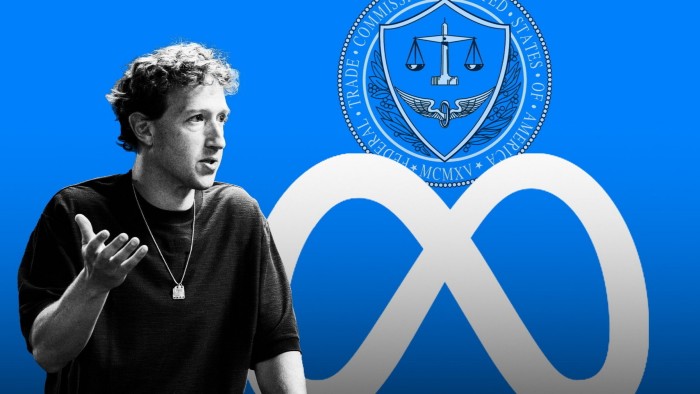Meta and the US Federal Trade Commission are set to face off in federal court this month, in the first big test of whether the new Donald Trump-appointed antitrust regulator will continue to crack down on Big Tech.
The looming trial, set for April 14, has seen Mark Zuckerberg meet the US president in recent days in an apparent last-minute lobbying attempt to avoid a court showdown.
The trial will represent the most serious antitrust challenge in Meta’s history, and could result in the $1.5tn tech giant being forced to unwind its acquisition of messaging platform WhatsApp and photo-sharing app Instagram.
The case will also be the first signal of how new FTC chair Andrew Ferguson, who accuses Big Tech of encroaching on personal liberties, will approach an industry that is now aggressively courting the White House.
Meta appears to be exploring a settlement with the regulator in advance, thereby avoiding a trial that would have Zuckerberg, former chief operating officer Sheryl Sandberg and rival leaders at TikTok, Snap and Google’s YouTube take the witness stand.
Zuckerberg has attended regular meetings at the White House, including one on Wednesday, as part of an escalating push to curry favour with President Trump and seek favourable outcomes for Meta. The White House, Meta and the FTC all declined to comment on the meeting.
Bill Kovacic, a former FTC chair, noted that it was more difficult to settle a case that proposed a structural remedy such as a break-up than one proposing money damages. But “you could take steps to give other firms data [and] knowledge about customers that you’ve accumulated by ownership,” he said. “The attractiveness of the situation depends on what Meta is offering.”
Zuckerberg’s efforts come as the new FTC chair has strongly hinted he will stick with the hard line on Big Tech that was ushered in by his predecessor Lina Khan.
Ferguson is part of a new generation of populist Republicans embracing tough antitrust enforcement, particularly against Silicon Valley giants, accusing them of censoring conservative voices. He has pledged to enforce competition laws “vigorously” and has said that the “Trump-Vance FTC will never back down from taking on Big Tech”.
The FTC chair on Wednesday criticised what he deems previously lax scrutiny of Big Tech, warning against the government not addressing the risk of monopolies. “Then we wind up in a situation where we have Meta-Instagram,” he said at an event held by start-up incubator Y Combinator.
While Silicon Valley had hoped that Trump’s return to the White House would unlock dealmaking, Meta’s case could be a powerful tool to discourage anti-competitive acquisitions.
The trial comes more than four years after the FTC first sued then-Facebook over allegedly maintaining an illegal monopoly. The antitrust regulator during Trump’s first presidency accused the group of quashing nascent competition by buying up rivals Instagram and WhatsApp, made in 2012 and 2014, for $1bn and $19bn respectively, and asked for the deals to be unwound.
It has “significance both as it relates to these Meta acquisitions and to the broader principle of deterring dominant firms from gobbling up [budding rivals and employing] a Pac-Man defence”, said Bill Baer, former head of the DoJ’s antitrust division.
The FTC alleged that Meta had a “systemic strategy” to stifle competition, including a “buy or bury” approach of snapping up rivals or cutting off services to those that threatened its monopoly power.
Meta is expected to argue that it boosted rather than buried its acquisitions, which had already been cleared by the FTC, and to point to the rapid growth of social media rivals such as TikTok, according to experts.
Multiple analysts noted that James Boasberg, the judge presiding over the case, had been sceptical about the FTC’s arguments, initially dismissing a first complaint on the grounds that it was “legally insufficient” before accepting a refiled case in 2022.
Boasberg presiding over the case injects fresh drama into the high-profile proceedings, as Trump has previously clashed with him after the judge temporarily blocked a government measure that sought to accelerate deportations.
“The FTC clearly has an uphill climb ahead, and the outcome of the case will be an important lesson in whether general animosity toward Big Tech can translate into persuasive cases under the demanding standards of” US anti-monopoly law, said Maureen Ohlhausen, former acting FTC chair.
Unwinding deals is generally complex, particularly if they closed more than a decade ago as in Meta’s case, experts said.
The Meta trial follows the crackdown on Big Tech unleashed by progressive officials appointed by former President Joe Biden, including Khan, former FTC chair, and Jonathan Kanter, former head of the US Department of Justice’s antitrust division.
They secured big wins including a US federal judge finding Google guilty of maintaining an illegal monopoly in online search last year and getting the Meta monopoly case to trial after an initial dismissal.
But the FTC also suffered some setbacks, such as failing to stop Meta’s acquisition of virtual reality business Within and Microsoft’s purchase of video games company Activision Blizzard.
If the trial goes ahead and Meta is found guilty, a second phase would determine potential remedies. Citing the Trump administration’s recent attacks against perceived opponents, a former senior antitrust official said it was “hard not to worry about whether” it would “follow the rule of law rather than rule by law”.
“This is an opportunity for the FTC to have a reset,” said Paul Swanson, who leads the antitrust and competition practice at law firm Holland & Hart. “If they continue to have big swings and big misses they lose some of that authority and power in the eyes of companies. They will benefit from a win here not just in this case, but in taking on other markets.”
